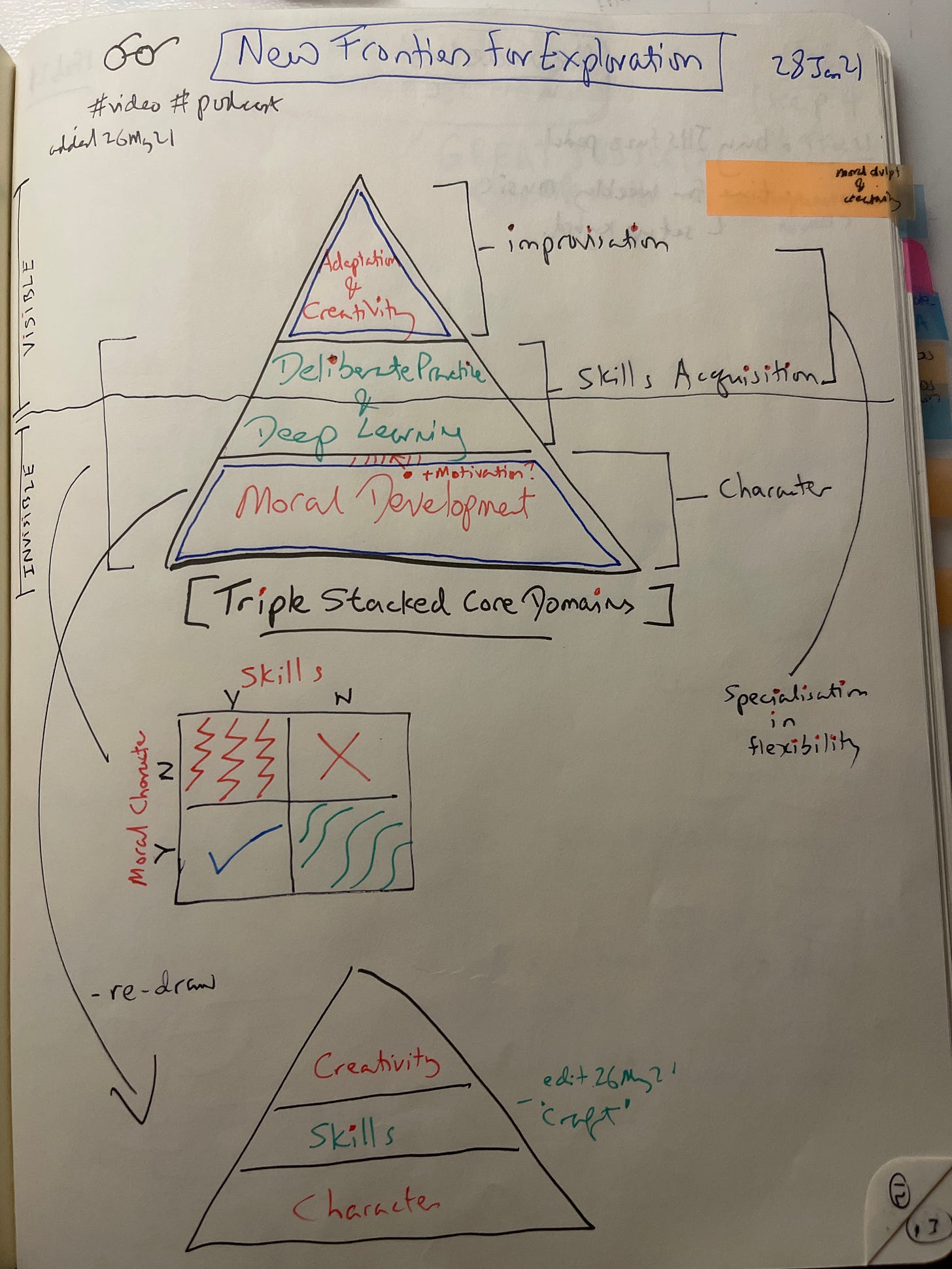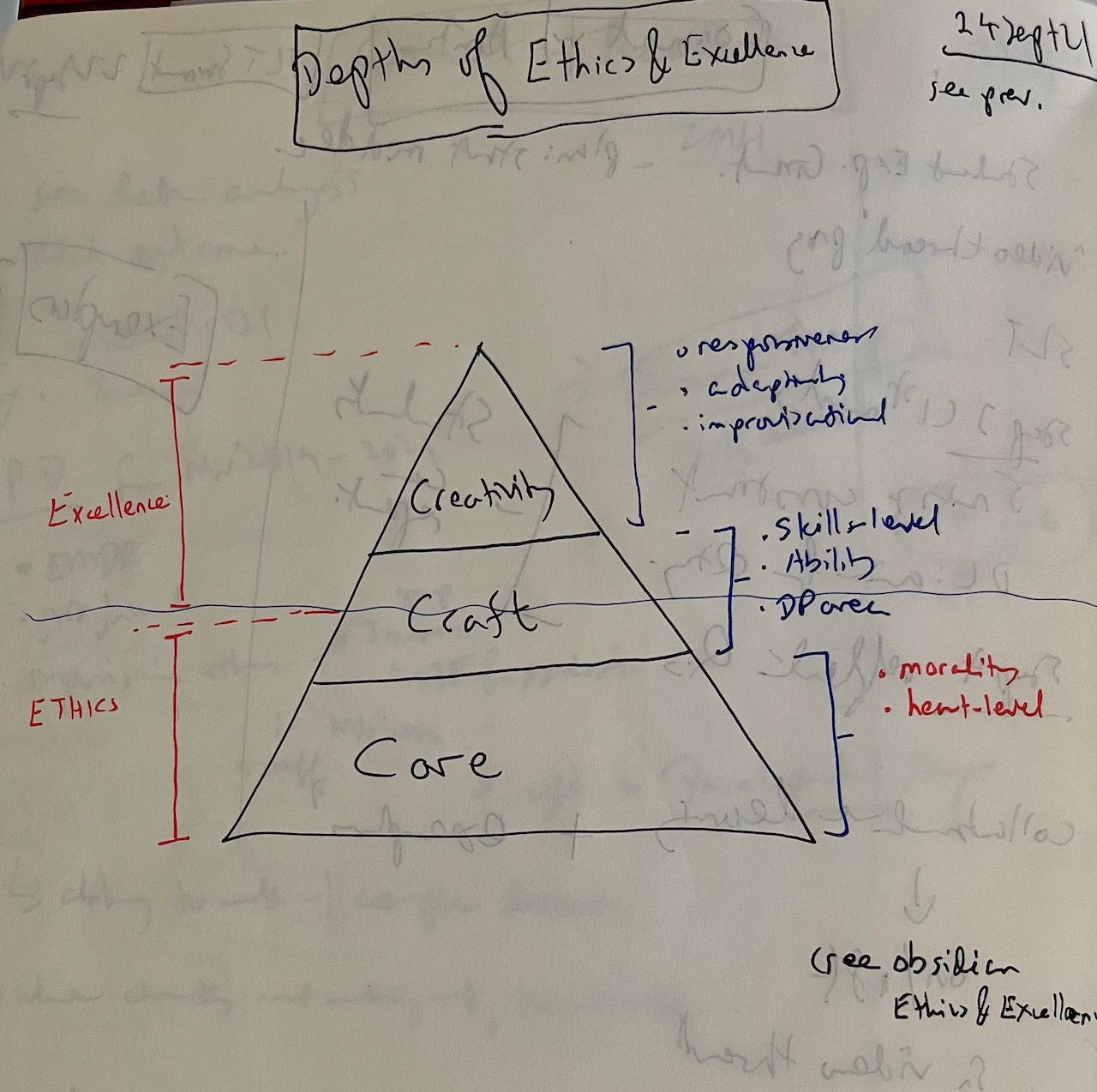Depths of Excellence and Ethics. Frontiers Friday #150 ⭕️
The Craft, Care, and Creativity involved in the practice of psychotherapy.
People don't care how much you know until they know how much you care.
~ Coach John Wooden, from You Haven’t Taught Until They Have Learned, p.9
I’ve been chiseling at this for far too long. Since late January 2021, I’ve been trying to figure out a way to articulate what I’m about to describe in today’s post.
I think there is some further shaping to do, but I would like to share this with you on Substack, before it goes into the archives in Frontiers of Psychotherapist Development (FPD) blog sphere.
If you have reactions or suggestions, I would love to hear from you in the comments below.
What I’m going to try to describe are 3 levels of thinking about the topic of excellence and ethics, or performance character and moral character.
The 3 Layers
Here’s an overview of what I’ve been thinking about: Craft, Care, Creativity.
Let’s start with the centerpiece of the iceberg: Craft.
I. Craft
Much of our efforts have been focused in this domain of craft.
Craft is about the development of expertise.
In our striving to do better and be of better help to our clients, we embark on ways to improve our skills and abilities. We engage in deliberate practice in order to hone in on our craft as relational beings, figuring ways to move the needle in achieving better outcomes, one client at a time, one therapist at a time. (For more on what deliberate practice looks like, see this post)
As we have described elsewhere,1 Deliberate practice is not just mere repetition, but it is guided by
Figuring out where you are (i.e., baseline performance),
Where you need to grow (i.e., your zone of proximal development),
A system of deep and personalised learning, and
Within an environment of feedback.
II. Care
Besides Craft, there is another dimension that we often take for granted.
A distinct and interdependent factor to consider besides performance character is moral character.
What is character? In the book Leading with Character, Jim Loehr says,
The word “character” comes from the Greek word, “kharakter,” a chisel or marking instrument for stone or metal.
In a sense, we chisel our true essence from the bedrock of life, one moral decision at a time.
Think about this. In our psychotherapeutic work with each person that shows up in our office, the defining mark is how we treat others.
Am I patient, or am I hurried?
Am I listening in order to speak, or am I speaking in order to listen?
Am I opening myself to the explorative possible with this person, or am I going in with a fixed agenda?
Am I relating with this person with dignity, or am I becoming transactional?
In a sense, this second component of Care is hidden in plain sight. It is our hidden scorecard. There is no quantified outcome measure of success in this domain.
On the one hand, expertise is often associated with technical knowledge and skill, which can be used to achieve specific goals or outcomes. On the other hand, morality is concerned with questions of right and wrong, and the ethical implications of our actions and decisions.
Samuel and John Philips provides their definition of character, one that meets both mind and morals:
Goodness without knowledge is weak and feeble, yet knowledge without goodness is dangerous. Both united form the noblest character.2
Expertise can be used for both good and bad purposes, depending on the moral character of the expert. For example, a skilled surgeon might use their expertise to save lives, but they could also use it to harm others if they lacked a strong moral compass. Similarly, a financial expert could use their knowledge to help people make wise investments, but they could also use it to exploit others for personal gains.
Thankfully, most therapists I know are in this profession because of deep care and regard for others. Many have also experienced being in the receiving end of such guidance. But this side needs to be returned to, again and again. Returning back to your unique “origin” story can serve as an anchor. Because in order to care for others, we must tend to our inner life, and remember in the first place, what brought me to want to be help to others in the first place?
Craft and Care are not mutually exclusive; we need to work on both. Craft manifests more externally, whereas Care is an interior condition.
One time, I kept count on how many times in one day at my clinical practice I had to exercise moral judgment. I quickly noted these down between sessions. There were at least 3 instances:
A young client wasn’t keen to talk… there was a part of me that just wanted to let that be and not bother with trying a different tact. Thankfully, I kept at it. I later learned that something had happened to him at school earlier. So we went there.
Another client had to change the session to a telehealth call. Since she couldn’t see me, I found myself tempted to check my email during the call.
Third client had a last minute cancellation. Should I charge cancellation fee this time? But he’s struggling financially…
Only I know this about this hidden scorecard.
III. Creativity
Finally, let’s switch gear. A third domain exists right at the top of the ice-berg: Creativity.
I think of creativity as the following:
Creativity = Making connections + creating something novel and valuable.3
Specifically, for the use of this word in the practice of psychotherapy, to be creative is to be
Responsive,
Adaptive, and
Improvisational.
Ben Stiles and colleagues4 defined what it means to be responsive in the therapy room:
…behavior that is affected by emerging context, including emerging perceptions of others’ characteristics and behavior…involving bidirectional causation and feedback loops.
In suggesting that psychotherapy is responsive, we mean that the content and process emerge as treatment proceeds, rather than being planned completely in advance.
In other words, as we open ourselves to the interactional process, we can't help but be altered, and we adapt and utilise what the client brings into the therapy room. Such a process is more akin to an improvisational jam session than a performance of a classical piece, pre-ordained on a musical sheet.
But wait. Could it be that some therapists somehow are more creatively flexible?
A seminal study by Baldwin and Wampold hints at a potential answer. This is their research question in plain English: Who is responsible for the alliance?5
They tested to see if the alliance-outcome relationship was due to one of the following:
Client (i.e., some clients are better at forming a collaborative relationship);
Therapist (i.e., some therapists are better at forming a collaborative relationship);
The interaction between client & therapist (i.e., it is the fit between two parties).
Alliance happens as a consequence of good outcomes (i.e., this is a reverse of the alliance-outcome relationship, that is the change experienced in therapy led to better alliance formation).
Most people I quiz at workshops pick #3. The fit between client and therapist. What Baldwin and Wampold discovered was not what we intuitively would have guessed.
The alliance boiled down to differences between therapists, which accounted for a significant proportion of the alliance-outcome correlation (#2).
What’s more, the differences between therapists accounted for 97% of the variance in client-rated alliance (You’d rarely hear a single factor accounting for such a big proportion of the variance in social sciences).
Said simply, some therapists are flexibly better at working with a wide range of folks than others.
Finally, it's worth stating that to be “improvisational” doesn’t mean “anything goes,” "just go with the flow,” or “winging it.”
Improvisation, originates from the Latin 'improvisus', meaning “not yet seen ahead of time.”
In discussion about music improvisation, Ted Gioia (incidentally, one of my favorite writers on Substack) says,
The improviser may be unable to look ahead at what he is going to play, but he can look behind at what he has just played, thus each new musical phrase can be shaped with relation to what has gone before. He creates his form retrospectively. ~ Gioia, 1988.
Or consider anthropologist Gregory Bateson, who had a significant influence on the evolution of family therapy:
The theorists can only build his theories about what the practitioner was doing yesterday. Tomorrow the practitioner will be doing something different because of these theories,”
In other words, it is after the fact that we develop a theory of our own. Before that, we improvise and learn.
I think of the disposition of improvisation as the following:
Improvisation = Openness and freedom to listen + Willingness to take risks - Expectations
Indeed, the practice of improvisation is paradoxical. If development of our Craft is develop expertise, the practice of Creativity is to be unpracticed. To suspend our existing knowledge and willing to apprentice ourselves to each person’s experience.
The enemy of improvisation is control. Instead, there is an active surrender to relational endeavor, whilst guiding the dynamic process based on the emergent conversation.
Excellence and Ethics
In looking at the 3 domains of Craft, Care, and Creativity, we can group them into two broad categories: Excellence and Ethics.
Here’s a list to contrast the differences:
Excellence
- Performance
- Driven
- Push for results
- Goal-oriented
Ethics
- Care for the other
- Deep listening
- Soften to relate
- Soul-oriented
In my estimation, Craft exists in-between Excellence and Ethics. Craft is to strive to do better, but it also has a dimension of not only being goal-oriented for skills acquisition, it also requires you to be soul-oriented and to give you undivided attention to the person in front of us.
Meanwhile, Creativity is perhaps our fullest expression of excellence. By being an active agent of connecting the dots, we are co-creating something vibrant and useful in service of the other.
Examples of Missing Pieces
Here are some hypothetical examples if some pieces of the iceberg are missing:
1. A therapist with Care, but no Craft and Creativity.
- This therapist is prone to feel helpless and impotent.
- Likely to become easily overwhelmed
- Prone to burnout.
2. A therapist with Craft, but no Care and Creativity.
- Most therapists would be ok in the short-term, but not sustainable in the long-term.
3. A therapist with Creativity and Care, but no Craft.
- Clients might experience this therapist as really caring by somewhat disorganised.
4. A therapist with Craft and Care, but no Creativity.
- Some clients might benefit from this therapist, but some might find this person rigid or inflexible.
6. A therapist with Craft and Creativity, but no Care.
- Refer clients elsewhere.
The Takeaway:
There is more to be said, especially around the domains of Care and Creativity. But for now, here are three takeaways:
Each of the 3 domains needs our attention. I believe these can be cultivated.
Emphasising solely on Craft is likely to be insufficient, and
The morality of Care is hard to talk about, but I believe it deserves more of our attention—like brushing our teeth, we should be attending to this, twice daily. The continuous praxis for therapists is to make space, slow down, and learn to soften.
It’s not just about being guided by the ethics of fear (e.g., I better to do right thing and not get in trouble with the governing bodies), but by the morality doing what’s right for the common good.
In that process, we turn outward. We learn a form of graceful self-forgetting.
May the words of legendary basketball coach, John Wooden continue to reverberate:
People don't care how much you know until they know how much you care.
Please let me know what you think of this article. Your thoughts and reflections are much appreciated.
Reflect:
Which of the three domains, Craft, Care and Creativity, is calling out for more of your attention?
Who do you know that embodies this depths of excellence and ethics?
Notice Board:
Calling clinical supervisors: Reigniting Clinical Supervision (RCS) course is back. For more details, see this Substack Note.
Warm Welcome to New Folks on Frontiers of Psychotherapist Development (FPD)
If you are new here, I just want to say a big hello to you and would love to hear from you. Tell me a bit about you and where you are from. Drop me an email info@darylchow.com
Click here to see more resources about Frontiers of Psychotherapist Development and Frontiers Friday.
Daryl Chow Ph.D. is the author of The First Kiss, co-author of Better Results, and The Write to Recovery, Creating Impact, and the new book The Field Guide to Better Results .
Chow, D. (2017). The practice and the practical: Pushing your clinical performance to the next level. In D. S. Prescott, C. L. Maeschalck, & S. D. Miller (Eds.), Feedback-informed treatment in clinical practice: Reaching for excellence(pp. 323–355). American Psychological Association.
Chow, D., Miller, S. D., Seidel, J. A., Kane, R. T., Thornton, J., & Andrews, W. P. (2015). The role of deliberate practice in the development of highly effective psychotherapists. Psychotherapy, 52(3), 337–345. http://dx.doi.org/10.1037/pst0000015
Miller, S. D., Chow, D., Hubble, M., Wampold, B., Maeschalck, C., & Bargmann, S. (2018). To be or not to be (an expert)? Revisiting the role of deliberate practice in improving performance. High Ability Studies. https://doi.org/10.1080/13598139.2018.1519410
Miller, S. D., Hubble, M., & Chow, D. (2018). The question of expertise in psychotherapy. Journal of Expertise, 1(2).
Miller, S. D., Hubble, M., & Chow, D. (2020). Better results: Using deliberate practice to improve therapeutic effectiveness. American Psychological Association.
Cited from Smart and Good: Integrating Performance Character and Moral Character in Schools By Matthew Davidson and Thomas Lickona 2007
Margaret Boden defines creativity in 3 forms: Combinational, Exploratory and Transformational.
See Ben Stiles body of research on the topic of responsiveness in psychotherapy. Stiles, W. B., Honos-Webb, L., & Surko, M. (1998). Responsiveness in psychotherapy. Clinical Psychology: Science and Practice, 5(4), 439–458.
This summary of Baldwin and Wampold’s 2007 study was extracted from my previous post in Nov 2018, What Does General Athleticism Got to Do With Psychotherapeutic Skills?
Baldwin, S. A., Wampold, B. E., & Imel, Z. E. (2007). Untangling the Alliance-Outcome Correlation: Exploring the Relative Importance of Therapist and Patient Variability in the Alliance. Journal of Consulting & Clinical Psychology, 75(6), 842–852. https://doi.org/10.1037/0022-006X.75.6.842









Daryl, thank you for this post. I much appreciate you raising the topic of character & its intimate connection to ethics, morality & excellence. This is so important in our development as sound humans, which is essential to our development as excellent therapists, supervisors & coaches. It would be wonderful if character development & ethics training were more central in the training & supervision of therapists.
My Stoic teacher, Massimo Pigliucci, has thought much about character development & written about it in "Five insights about character" (https://figsinwinter.substack.com/p/five-insights-about-character) which summarises the key points in his book "The Quest for Character"(https://www.goodreads.com/book/show/60021170-the-quest-for-character). He argues that character (ethics, morality & excellence as you say) can & must be trained & underpins the development of any craft. I think what he says in the following quote applies equally to therapists: “According to the Greco-Romans, virtue understood as human excellence is a skill (techne) and therefore can be taught, just like any other skill. Imagine you wished to learn a musical instrument, or maybe a new language. How do you go about it? You will learn some basic musical theory or grammar; you will get a good teacher who can guide you; and then you’ll practice, practice, practice. The same goes for virtue: you become a better person by learning a bit about ethics, by following a good teacher like Socrates, and by doing a lot of practice.” Sounds pretty much like Deliberate Practice to me & much like your writing.
You may be aware that the Stoics, one of three lineages inspired by Socrates, influenced the founding fathers of Christianity & were reciprocally influenced by the major world religions & philosophies due to trade in the Mediterranean basin. Perhaps it is the lack of education & guidance in developing a clear, individual philosophy of life which contributes to the ills in our world today - clients, therapists, supervisors, educators & coaches included? That’s why coach John Wooden was such an inspiring role model.
Conlan, really appreciate this. I hadn't made the connections to Alan Schore's work.
i resonate w your mentor's words
>"you can’t look for inspiration on the peaks of your own field.”